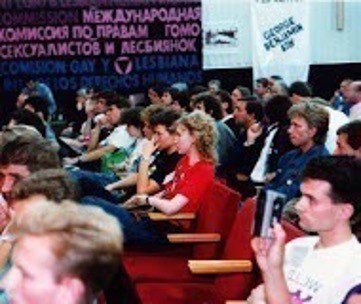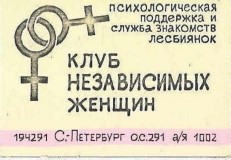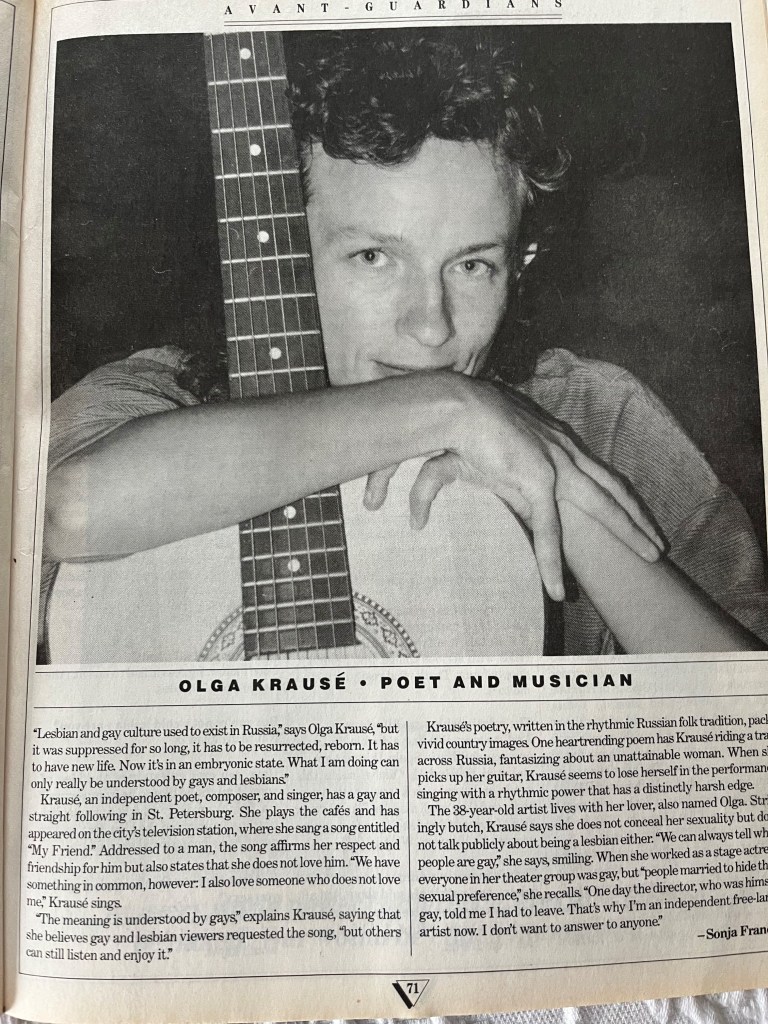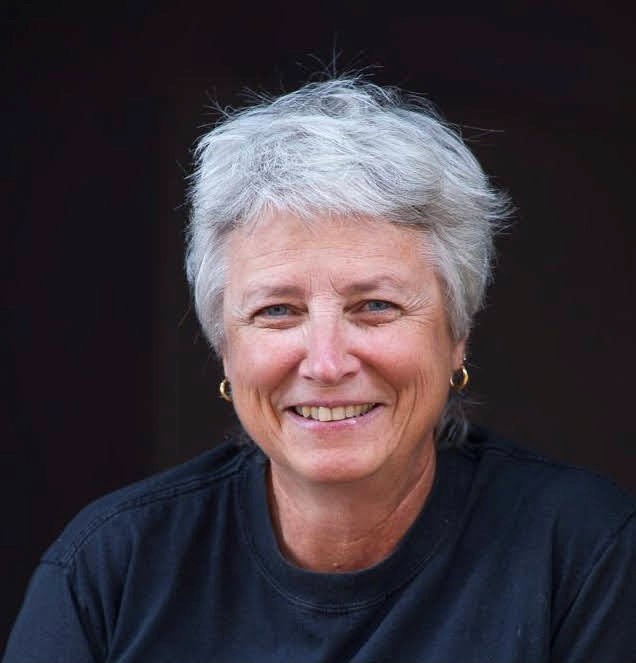“Обстрел прекратился в 11:30. Пока всё тихо. У нас в квартире тепло, работает водопровод и центральное отопление. Нет электричества, но светит солнце и на улице тает снег.” [The shelling stopped at 11:30. For now everything is quiet. Our apartment is warm, and there’s running water and central heating. No electricity, but the sun is shining and the snow is melting outside.]
—my friend Olga Krauze writes from Kharkiv, the second largest city in Ukraine. I was interviewing her on Zoom for this profile and we got interrupted. Olga is a poet and singer and I’ve known her since 1991. She has lived in Kharkiv for 12 years with her partner Elina, who is Ukrainian.

I first saw Olga Krauze standing in front of the Leningrad Cultural House of Vocational Education Workers on a warm sunny day in July of 1991. She had a modest, unassuming look about her, brown medium length hair, about 5’4” and dressed in a light colored shirt and dark pants. I was there as a part of a delegation of 65 North Americans, just arrived and ready to have the first International Gay and Lesbian Symposium in Leningrad, followed by a queer film festival and conference in Moscow. We were armed with cameras and English books and magazines and other gay paraphernalia. No, we were not missionaries. Lesbians and gays, bisexuals and transgender people already existed in Russia. After decades of hiding, this was the first significant encounter Olga and other Russian queers would have with Western queers who were open about their sexuality. Apparently, the “Dvorets” or Palace of Culture had no idea who they had rented their space to, as Olga later found out. According to them, the event was scandalous.

After that turning point, Olga Krauze continued to write and sing but grew bolder. She added queer activism to her work, first by helping to lead an organization with gay men called Wings and then by creating a support group for women, namely lesbians, called the Club of Independent Women. This queer activism was revolutionary for Russia, but it was perestroika and suddenly there were a lot of possibilities for lesbians and gays to come out of their closets.

Shortly after I met her, I did a profile of Olga Krauze in the December 1991 issue of The Advocate. She has since published seven books, appeared in numerous anthologies and journals, and given numerous concerts. In fact, she is still very much in demand but, of course, the war has curtailed concerts.
Olga Krauze’s prose ranges from memoir Исповедь авантюристки [Confessions of an Adventurer]; to fantasy Где-то под Питером [Somewhere Around Petersburg], Свободный полёт [Free Flight], Пока они спят [While They Sleep]; to historical fiction За фасадом того сада [Behind the Facade of that Garden], Слобожанские пасторали [Slobozhanshchina Pastoral]; and fiction Катькин сад [Katya’s Garden]. She is currently writing a novel about the war which has not yet been finished but contains some of her best writing to date.
I love her poetry and songs very much. We are fortunate to have her collection of poetry Харьковская тетрадь. Стихи 2011–2018 гг. [The Kharkiv Notebook. Poems 2011–2018] about her time in Kharkiv, where she still lives. It deserves to be translated, especially now that people want to know more about Ukraine. Deeply personal, her reflections are full of natural imagery, people’s struggles, and her heartfelt realizations. Here is one poem from the collection:
Memoriale
Окно, в которое я ныряла,
вскарабкавшись через все этажи,
чтобы в твоей постели, в подушке хмельной задыхаться
от неутолимой жажды,
пока ты, гуляя с кем-то,
встречаешь утреннюю зарю.
Окно то, оно в том доме,
двор которого наглухо заперт
высокой стальной решеткой.
Двор давно уже не проходной.
А ты на далеком погосте,
куда твои внуки доехать
могут разве что раз в году.
Живу, вспоминаю многих.
Все чаще мне снишься ты.
02.09.2019
Memoriale, by Olga Krauze, translated by Sonja Franeta
The window I dove into
After clambering up through all
The floors to get into your bed
To breathe in your intoxicating pillow
With my unquenchable thirst
While you walk with someone
In the dawn of early morning.
That window, the one in that house
Where the yard is tightly shut
With a high steel gate.
That yard has long been blocked.
And you, in a distant graveyard
Where your grandchildren can go
Only once a year.
I live and remember so many.
More and more I dream of you.
Olga Krauze sang one of her lesbian poems called “Курила, курила, курила” [“Smoked, smoked, smoked”] in her apartment in Kharkiv and sent it to me for a talk I recently did on Zoom. My translation follows:
By Olga Krauze, translated by Sonja Franeta
I smoke, smoke, smoke way down to the filter.
Wiping tears from my cheeks, I go out
But I leave with a smile. Much better like this—with laughter.
And a silly, stupid joke for everyone’s amusement.
I order wine and get drunk to honor such merriment.
Walking on, walking on! And a hangover tomorrow.
But I know I’ll be shaking in the train, remembering
All the things no one else will ever know.
No one can find out about my resentment and anger.
No one can know my tears—“What a fool, good for her.”
No one can know what you told me then
As I smoked, smoked, smoked, smoked.
Where I’m going, everything will be completely different.
Where the train is taking me will be better than home.
I’ll sell my suitcase. It’s shabby and messed up.
I could quit smoking and buy myself a new hat.
A beautiful hat, with a shiny copper buckle.
With this hat on I would visit your city by chance.
And in our café sit down to sip Turkish coffee.
You’d look at me curiously but not like a child.
Then you’d call me over to have a smoke with you outside.
And I’ll be cool and say “I don’t smoke anymore, sorry.”
You’ll never remember what you once told me there,
Once long ago when I smoked, smoked, smoked.
Besides her lesbian activism, Olga has always been very political. She supports the Ukrainian cause without reservation. Olga was born in Leningrad in 1953 to parents who were railroad engineers, yet her heritage was quite mixed—of Jewish, Latvian, and Austrian background.
This kind of multinationalism was common in Russia and it has been characteristic of people in Ukraine too. In the 1930s and 1940s, during Stalin’s reign, people were forcibly moved around because of their ethnicities, as well as sent to the Gulag. The Soviet Union went from internationalism to Russification—the forced adoption of the Russian language throughout the Soviet republics. Many of the ethnic nationalities lost their connection to their own languages, including in Ukraine.
After the breakup of the Soviet Union, Ukraine was one of the first republics to declare independence. Olga supports the Ukrainian nation because she knows how necessary it is for Ukrainians not only to recover their land and country but to own their language and culture. She and her partner have stayed in and around Kharkiv with their cat throughout the war. The difficulties are hard for those not in Ukraine to imagine. An excerpt from Olga’s recent poem:
Опять был взрыв, или это
хлопнула дверь у соседа?
Надо сходить за хлебом.
Надо, но там нет света.
Отсутствие света не та утрата,
когда работает генератор.
Но там, где работает генератор,
хлеба нашего любимого нет.
Значит жди, когда будет свет
и благодари судьбу,
что ты не в Купянске и не в Волчанске,
и уж тем более не в Бахмуте…
By Olga Krauze, translated by Sonja Franeta
An explosion again? Or was it
the slam of our neighbor’s door?
I must get some bread.
I must, but there is no light.
The absence of light does not mean it’s out
If the generator is running
But wherever there is one running
Our favorite bread is no longer.
So let’s wait for the light to come
Thank the stars we’re not
In Kupyansk or Volchansk,
And especially not in Bakhmut…
Donations are appreciated and can be sent directly to Olga. Contact me at sfraneta at yahoo and I will send you her information. [PL: link to Sonja’s email withheld to avoid bots; we’re happy to assist in making the connection.]
On her website are links to all of her published books in Russian. Olga’s prose has not appeared in English yet, and she is very open to working with interested translators. Her work is rife with humor and keen observations of fellow human beings and it has a lot to give to English-language readers.
Olga Krauze’s website: https://olgakrause.com/
Olga’s writings on проза.ру: https://proza.ru/avtor/krauzeolg
Links in Engish: https://www.opendemocracy.net/en/odr/from-shadows-into-light-and-back-again/
gay.ru (not active right now but there are links to sites about Olga): ttp://az.xgayru.info/authors/russian/olga_krauze.htm
https://www.svoboda.org/a/28053527.html (Radio Free Europe)

Sonja Franeta is a writer, educator, translator, and activist born in the Bronx to an immigrant Yugoslav family. In 2004, she published ten interviews of Siberian queers, Rozovye Flamingo, in the original Russian, in collaboration with friends at the LGBT Archives in Moscow. In 2017, Sonja Franeta’s translation became available in English—Pink Flamingos: 10 Siberian Interviews. Her collection, My Pink Road to Russia: Tales of Amazons, Peasants and Queers, came out in 2015 and is now translated into Russian as well. She has translated her favorite writers: Marina Tsvetaeva, Sofia Parnok, and others and worked in Moscow and Novosibirsk in the 1990s. Now she divides her time between St. Petersburg, Florida and northern Spain with her partner Sue and two cats.

One thought on “Olga Krauze, a profile by Sonja Franeta”